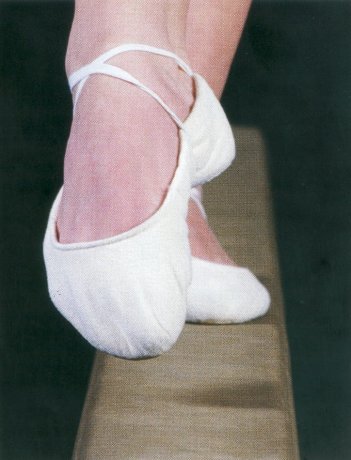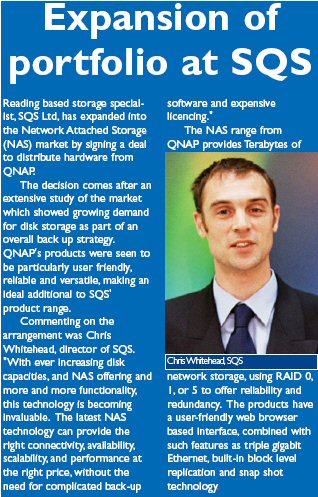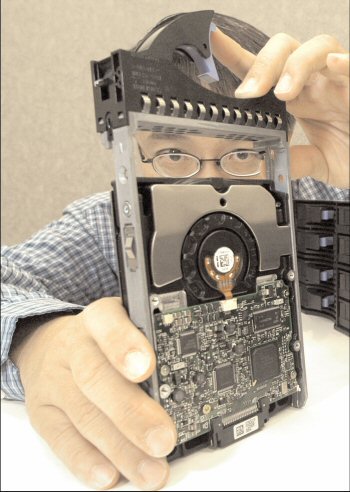SQS in the News
2006 has seen SQS in the industry press again. We have reproduced the articles here by the kind permission of Wilson Marketing.
Storage Feature

The battle between storage formats will ultimately be won by the offering which can adapt best to the current and future market conditions. But it is not just the products that should champion flexibility - those who support the market need to be on their toes if they are to keep up.
While the rest of the hardware market continues to lull in the doldrums, the market for storage products and its associated support continues to thrive. In this article, we will look at some of the key growth areas, debate the relative virtues of tape and disc, and attempt to paint a picture of what the storage market will come to resemble in the next few years.
Activity surrounding storage is particularly volatile in the legal and financial services industries according to Chris Whitehead, director at storage solutions specialist SQS. Driven by compliance regulations and the physical need to hold masses of information, these two industries are the first attempting to create the truly paperless office. Whitehead says that by instantly scanning and archiving all documents, organisations from these sectors are pushing the concept of storage to unimaginable limits.
Such moves of course crank up the pressure on storage solutions to deliver and this is pushing greater investment into the market. Experts such as SQS are tweaking their business model to accommodate the burgeoning interest in not just storage hardware, but the complete delivery, installation and support of storage systems. "Much of our business is now consultancy-based. Storage is not only vital for business but also expensive - the high-end disc devices can cost hundreds of thousands of pounds. When you set up a NAS (Network Attached Storage) it will need a lot of users hooking into it at any one time and you need to consider factors such as how quickly you can recover data and get your staff back to work after a disaster," details Whitehead.
The high-end prices that traditionally accompany high-end storage solutions are gradually being reduced as Whitehead goes on to detail, creating what he describes as a two-tiered product market. "There are two defined markets. First are the enterprise-sized companies which are moving away from tape and towards ultra-high capacity drives. Then there is the SME market which is tending towards AIT's and VS 160s - the slightly cheaper, lower transfer speed devices."
The point is that even modest sized companies can afford storage speeds and capacities which offer the ability to transform the way business is conducted. This is particularly true with back-up, which is undergoing major changes as Whitehead describes. "With the speed of the internet now and the improvement in disc technology, it is relatively simple to replicate your data offsite, either by finding a friendly company and creating a reciprocal agreement, or by putting a drive in the company director's house, or by paying a third party storage specialist.
"This trend has spurred us to begin producing our own NAS (Network Attached Storage) devices, ranging from 2000 GB up to 200 terabyte capacities. We will still support the QNAP range, but with our own NAS equipment, we will allow lots of flexibility, such as the ability to run it with Netbackup, or a Windows storage server or Linux - whatever the customer requires in essence."
The burning issue once the unstoppable rise of disc storage is considered is therefore this: is there any room left for tape? Absolutely, says Jan Jacobs of Netherlands-based storage repair specialist, Aspan Computer Repair Laboratories B.V. "We handle repair of major brands such as Maxtor, Fujitsu,Toshiba and Seagate. Tape is still extremely popular and I think that as the newer models come in, with ever improving speeds and storage capacities, they will remain popular for the foreseeable future.
"The most popular products for us at the moment are Super DLT 7000 and 8000 tape drives, and also LTO repair. LTO 3 drives are still under warranty, but once these run out we expect to do business with this format."
In fact, the continued popularity of tape and its own rapidly growing disc support business have allowed Aspan to buck the trend and expand its footprint. "We have expanded the size of our warehousing facility in Tiel this year to 8,000 square feet. We have done this because business is good and are taking on more assembly and logistics work from Europe and across the world:"
Similarly, despite having fully embraced the market's appetite for disc storage, SQS is still seeing excellent support for tape. "Tape is still a strong market, particularly with LTO 3 and soon LTO 4 which offer improvements. The most popular format is still LTO, and it will remain popular for some time. Many people still prefer the feeling of being able to physically move the back up around with them:' says Chris Whitehead.

"Much of our business is now consultancy-based. Storage is not only vital for business but can also be expensive;- Some high-end disc devices can cost hundreds of thousands of pounds."
Chris Whitehead SQS Ltd
In fact, the dominance of LTO is such that figures from industry analyst IDC show that it has an 82 per cent stranglehold on the tape market, showing at once the popularity of the format and overall strength and continued viability of tape as a viable back-up option.
However, the high-cost of tape is not helping its on-going cause. Also, bad habits die hard according to Whitehead, and it is the inability of many individuals to accommodate the cultural shift needed to safely back-up with tape that is in part driving the market towards disc and remote back-up. "You still need to physically move the tape to a safe location if you want effective back up. It is amazing how many people back up onto tape, and just leave the tape in their desk. Perhaps they should put a sticker on the drawer stating 'Mr. Fireman, please save the tape backup in here,"' concludes Whitehead.

The storage market has clearly embraced disc as its chosen medium for the future. Disc's lower costs, ever improving reliability and flexibility will see it slowly phase out tape. This however will take some time and the third party support market for tape should be good for another ten years, maybe more.
More importantly in the long term is the way in which disc-based storage is running parallel to the changing ways in which information is considered, managed and kept. Those supporting storage products need to think beyond the hardware itself and consider the wider implications of what customers require and expect.
ECS August 2006
---------------------------------------------------------------------------------

ECS January 2006
----------------------------------------------------------
Storage Repair Feature

Such is the breathtaking pace of growth for the storage requirements of businesses that few have had time to plan their long-term strategy. This could lead to a lethora of issues down the line, but can the problems be avoided?
With the digitalisation of information, from music and photography in the home, through to detailed customer records required by tightening legislation in the corporate sector, the requirements for storage today are huge. There is growth everywhere you look in the sector. A recent report from Gartner showed the market for external disk storage increasing almost seven per cent last year to a worth of $3.42 billion. Fellow analyst IDC is even more bullish in its assessment, predicting doubledigit growth for the sector up to at least 2009.
Does this level of business invariably filter down to the third party repair market, or is the cash flow too diluted when the urgency caused by the thick edge of the market subsides? Chris Whitehead, director of Reading based SQS gives his views on what is occurring in respect to his business. "With recent advances in both tape and disk capacities, we have seen many clients upgrading from older technologies to the newer, higher capacity and more reliable formats to cope with the increase in storage demands. Whilst just a few years ago, it was normal for every server to have a tape drive, more recently larger users employ a backup server or other method of centralised backup requiring a fewer number of drives but of maybe higher capacity. Although this has perhaps lead to a slight plateau in the repair market, SQS expects the market to remain buoyant due to the ever increasing amount of data needing to be stored," concludes Whitehead.
For tape back up, Whitehead says that LTO is the most popular, outselling SDLT technologies by a ratio of two or even three to one. "AIT is also popular for some of the SME (Small to Medium Enterprise ) companies and has now taken over as the favourite drive for small backups," explains Whitehead.
But it is not just hardware that companies such as SQS can offer the market now. Growing ever more important is the consultancy services that the quality suppliers can offer. A survey of 200 IT managers by networked storage distributor Zycko revealed that three quarters of SMEs (Small to Medium Enterprises) are 'overwhelmed' by the rapid growth of data in the marketplace. As a result of this surge, as many as 90 per cent of SMEs were panic buying solutions to try to plug the gap. This ad-hoc approach and lack of long term planning is likely to lead to a myriad of problems in the future, certainly given that our appetite for more storage shows no signs of abating.
"The complexity and vast range of technologies availabletoday means that the majority of SMEs without dedicated IT departments are simply left baffled and unable to differentiate between providers and products - with little in-house expertise to guide them towards the right decision," said David Galton- Fenzi, group sales director at Zycko.
Chris Whitehead says that companies are becoming wise to the problem highlighted by Zycko. "SMEs are seeking more advice than ever when it comes to planning their storage needs. With the number of alternatives increasing on an almost weekly basis, it is increasingly important for SMEs to have an overall strategy incorporating the best technology for their tailored to their individual requirements. This may include backup software and disk-based technologies such as a NAS box, in addition to the traditional tape drive or library backup.

The five-inch high Total Storage system from IBM is capable of storing almost half the collection of the U.S. Library of Congress.
"It is always advisable to consult a storage specialist such as SQS who offers free and impartial advice and who can tailor the products and overall strategy to meet requirements before making any final decisions. This ensures that the user what they want from the products now and also in the future." It is this long-term view that is so vital if businesses are not to become saddled with a mish-mash of storage options which will send maintenance costs soaring. There are signs however that the sort-term approach that has constrained the hardware market is slowly disappearing, as buyers look beyond upfront costs alone and start to consider the bigger picture. The realisation is that a company or individual offering a product at seemingly impossible margins is only able to do so by cutting corners, and service is one of the first phases of the product lifecycle which suffers.
Chris Whitehead has seen this cultural shift occurring first hand. "Many customers are now finding that good service and support is worth the extra investment as it removes the hassle factor from the customer and frees up both time and resources. This is certainly the case with the larger maintenance companies who have many drives repaired and see a real cost incurred should a drive fail under warranty. SQS can further help in these situations by providing an advanced exchange unit, requiring only one field call to rectify the problem instead of two, thus further reducing costs," concludes Whitehead.
Any additional investment will quickly pay itself back in the form of expertise, as Chris Whitehead again describes. "The key to recommending a particular device or strategy is knowing the customers expectations with regards to data quantity, back-up window and disaster recovery window requirements. For the heavy storage user this may mean faster transfer rates and higher capacities with minimal strain on their networks - maybe employing disk as well as tape based solutions. SQS supplies and repairs high end tape drives and tape libraries as well as disk-based solutions," says Whitehead.
It is almost too obvious to state, but company and personal data is too important and valuable to be left to chance. A piecemeal approach to the issue is likely to create many long-term policy and usability problems, and few companies have the in-house expertise needed to create a cohesive and effective setup.
With dedicated consultancies often too pricy for the SME market, the better option is surely to work with companies such as SQS who have years of experience dealing with storage technologies.
ECS January 2006